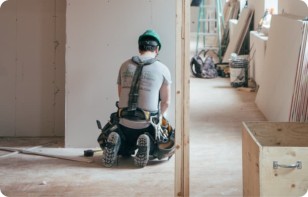Building a house in Germany - What you should consider
When building a house, you can design the property according to your wishes and you can even get away cheaper. Hypofriend explains to you what you have to consider.
Dr. Chris Mulder
Published on Oct 8, 2020 . Updated 6 months ago

Finding a property in germany that meets your expectations and fits into your budget can be challenging. Sometimes even impossible. Especially if the property should be modern. Instead of searching endlessly for the right property, the idea of building your own house can sometimes be a worthwhile one. It can be completely created according to your own wishes. What many don't believe: Building your own house is often cheaper than buying an existing one. Hypofriend explains what you have to consider when building a house in Germany, what your options are and what costs you have to calculate.
Table of Contents
- Find a plot of land to build on
- Building your own house in Germany means saving on the purchase costs:
- Closing costs for a property
- Building permit
- Duration of a house construction
- Building options - different types of houses
- Construction method
- Consider construction subsidies
- Insurances for building owners
- Is it worthwhile to have a surveyor?
- For whom building a house in Germany makes sense



